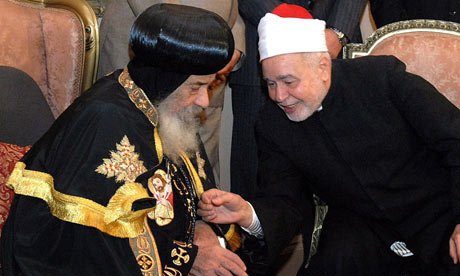The missing memories of Al-Azhar Rector Dr.Tantawi
4:42 PM Posted In Religious Edit This 0 Comments »
Sheikh Tantawi, right, with Pope Shenouda III, Coptic pope of Alexandria and the Patriarch of All Africa, earlier this year Photograph: Salah Ibrahim/EPA
He was born in the village of Selim ash-Sharqiyah in the municipality of Tama, Sohag, before joining a religious institution in Alexandria. After graduating from Al-Azhar's faculty of religious studies in 1958, he went on to teach. In 1966 he was awarded a PhD in Hadith (the sayings of Muhammad, Islam's second source after the Qur'an itself) and Tafsir, exegesis of the Qur'an. By 1980, he was the head of the Tafsir department of the University of Madinah in Saudi Arabia, a position he was to hold until 1984.
In 1986, when he had been dean of the faculty of Arab and religious studies for a year, he became grand mufti of Egypt, a position he held for a decade until appointed grand imam. He is survived by two sons and a daughter.
• Mohammed Sayed Tantawi, cleric, born 28 October 1928; died 10 March 2010
For 14 years, Tantawi used his position as grand sheikh of Al-Azhar University in Cairo to defend traditional interpretations of Sunni Islam against challenges from radical Islamist groups such as the Taliban and Al-Qaeda.
He repeatedly condemned the use of terrorist attacks against civilian targets and labeled extremism in general as against Islam.
"It is not appropriate to link Islam to terrorism and destruction," he said in an interview with RFE/RL's Tajik Service in October. "Terrorism means destroying lives of peaceful people, and all religions and humanity condemn it."
As the head of Sunni Islam's most prominent theological institute, Tantawi's opinions and fatwas carried tremendous moral and legal weight. Al-Azhar's teachers are traditionally respected throughout the Sunni Muslim world, and its grand sheikh's views are given particular consideration.
In 2003, Tantawi notably called suicide bombers "enemies of Islam." He also spoke out against the misuse of the word "jihad" by extremist groups, saying the difference between the meaning of jihad in Islam as a religion of peace and its meaning for extremist groups is "like the earth and the sky."
Tantawi was the "grand sheik" of al Azhar, Sunni Islam's principal center of scholarship and faith, a millennium-old institution that President Barack Obama described as a "beacon of Islamic learning" during his trip to Cairo in June
Tantawi, the Grand Imam of Al-Azhar -- Sunni Islam's highest seat of learning -- was in Riyadh to attend the King Faisal awards ceremony, a local news agency said.
Tantawi, 81, was boarding a plane early Wednesday morning when he suffered severe pain and fell on the stairs, Egyptian television said.
He was rushed to the Amir Sultan hospital in Riyadh where doctors pronounced him dead.
An Egyptian official said that Tantawi had died of a heart attack.
Immediately after the announcement of his death, sombre music played on Egyptian television to footage of Al-Azhar mosque. The news of his death was "an indescribable shock," his son Amr Tantawi told Egyptian television.
"The family has decided that since God chose for him to die on Saudi land, he will be buried in Al-Baqie" cemetery in Islam's second holy city of Medina, his son said
The Grand Imam was "one of the most honourable scholars in Islam, and one of the defenders of its moderation, enlightenment and spirit of forgiveness," Mubarak, said in a statement carried by MENA.
Tantawi was appointed head of Al-Azhar, the 10th century university that has trained the majority of Sunni Muslim clerics from Africa and Asia, by Egyptian President Hosni Mubarak in 1996.
"The Islamic and Arabic world has lost a scholar and a jurisprudent" who was "dedicated to his work and to everything that served the good of Islam and Muslims," Al-Azhar said.
The softly spoken cleric with a trim white beard, who was always seen wearing a traditional Azharite white turban, has long been a controversial figure in एग्य्प्त
Officials carry the coffin of Sheikh Mohamed Sayed Tantawi, the head of Egypt's most prestigious seat of Islamic learning al Azhar, at King Khalid International Airport in Riyadh March 10, 2010। Tantawi died of a heart attack on Wednesday during a visit to Saudi Arabia, religious officials at al-Azhar said। Riyadh March 10, 2010.



0 comments:
Post a Comment